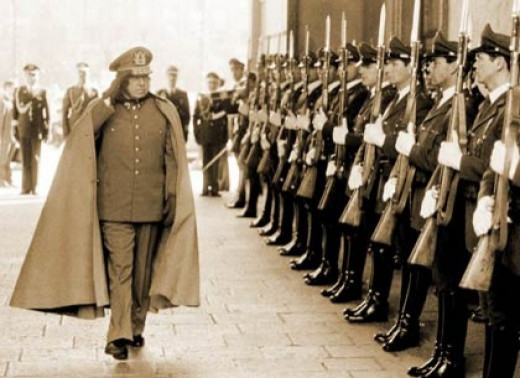Chile: Pinochet Documentary Raises Questions About Dictator's True Legacy
ANALYSIS

A new documentary about Chilean dictator Augusto Pinochet has sparked controversy among Chileans who have haunting memories of the military regime years when many people, targeted as political dissidents, were imprisoned, tortured, executed or disappeared.
A planned screening of the film in Santiago this weekend, hosted by ex-military organization the Union of Retired Officials of the National Defense (UNOFAR), has outraged Chileans that denounce Pinochet's legacy.
The film, titled Pinochet, examines the years of the dictatorship from 1973 to 1990, and has been described by its promoters as a historical briefing, non-confrontational and deep rigor to what happened in our country.
Some prominent Chilean politicians and local human rights groups have asked for President Sebastian Pinera to ban the screening, which they view as an homage to a brutal dictator, but the administration has emphasized the filmmakers' right to freedom of speech.
In our country, and in democracies, there is the legitimate right to express oneself, government spokesperson Andrew Chadwick said Tuesday.
Senate leader Camilo Escalona, affiliated with the Socialist Party of Chile, rejected the government's response and demanded that it publicly denounce the film.
The government cannot keep quiet, Escalona said, the Santiago Times reported. It is true that, from a formal point of view, the law does not authorize the cancellation of the event. But it appears to me that a condemnation from the public authorities is a moral obligation.
UNOFAR President Vice Adm. (ret.) Jorge Llorente has responded to critics of the planned event, saying that they must be angry because they're very scared.
Pinochet's image has been defamed, and they have tried to destroy his image, he said. But I will reiterate, he was the best president in Chile and he is the one who transformed Chile from being a poor country to the jewel of America.
Pinochet's Legacy
Pinochet came to power on Sept. 11, 1973, in a U.S.-backed military coup that ousted democratically elected President Salvador Allende.
There is no evidence that the U.S. played a direct role in the actual coup itself, though prior to the operation, the CIA under President Richard Nixon's administration had initiated a campaign to popularize U.S. capitalist economic policies and foment political dissent against the Allende government.
Allende, a member of the Socialist Party, was viewed unfavorably by the U.S. for his unwillingness to embrace neo-liberal economic policies that would have opened Chile's economy to private foreign investment, particularly U.S. firms seeking to establish a foothold in a wide array Chilean markets, including mining, energy, communications, finance and oil.
Prior to the coup, Pinochet, as an army general, began planning for an alternate government under military rule that would embrace economic policies favored by the U.S. and therefore receive its political support.
Once Pinochet had taken power, the U.S. sought to legitimize the coup and quickly established economic and political ties with the new regime.
While Chile's U.S.-favored economic programs allowed for a great deal of foreign capital to flow into the country, it was amassed at the top among the society's elite and privileged, while the wealth disparity between the classes widened.
Moreover, political dissent was met with brutal suppression. Human Rights Watch estimates that over 2,600 people were executed, died under torture, or disappeared during Pinochet's 17 years in power. Thousands more were imprisoned and tortured.
Toward the end of the eighties Pinochet, facing pressure amid a shifting geopolitical environment with the winding down of the Cold War, agreed to hold open elections and was voted out of power on Dec. 14, 1989, and formally resigned March 11, 1990.
After leaving power, Pinochet, who still had strong support within the military, was effectively granted immunity from prosecution over the crimes and human rights abuses committed under his rule.
Nevertheless, there were several attempts to prosecute Pinochet, including a high-profile court case in London in 1998, when a Spanish judge ordered his extradition over crimes committed against Spanish citizens in Chile during the regime's era.
The case was ultimately dismissed due to the state of Pinochet's health as he had traveled to the U.K for medical treatment. He was allowed to return to Chile in 2000 at the age of 84.
As dementia set upon Pinochet in the last years of his life, further attempts to prosecute him failed to gain momentum. He died under house arrest on Dec. 10, 2006, at age 91, without ever being convicted of any of the crimes committed during his dictatorship and having accumulated $21 million in assets, only $3 million of which could be accounted for by his military salary.
Even in death, Pinochet presented a dilemma for the Chilean government.
For example, he was not awarded a state funeral (since he was not constitutionally elected as president), but rather a military funeral to honor his service as former commander-in-chief of the army.
In addition, no official day or mourning was called in light of his passing, although the government ordered army barracks to fly the national flag at half-staff.
The president of Chile at the time of Pinochet's death, Michelle Bachelet, was a Socialist whose father had been tortured by Pinochet's soldiers. As such, she refused to attend the funeral. Indeed, only one senior government official the defense minister, bothered to show up.
© Copyright IBTimes 2024. All rights reserved.





















